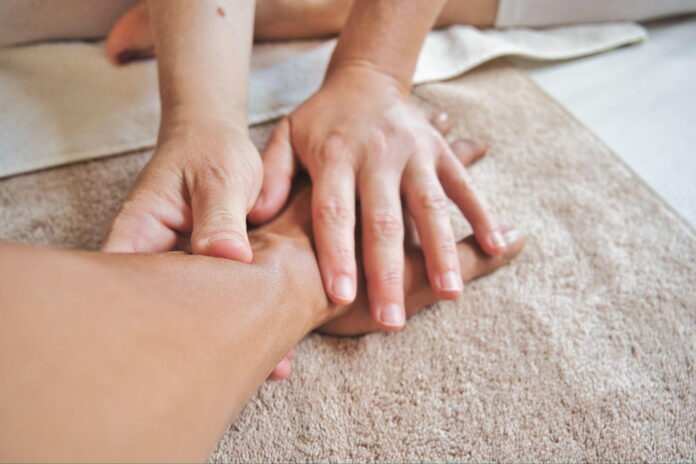Patients enrolled in physiotherapy sessions learn to overcome movement impairments caused by disease or injury, including elderly individuals experiencing pain and balance issues, infants born with developmental disabilities, as well as individuals living with heart or lung issues.
Athletes frequently turn to physiotherapy to manage injuries associated with the physical demands of their sport and manage long-term chronic health conditions like asthma or cystic fibrosis.
What is physiotherapy?
Physiotherapists (sometimes referred to as physical therapists) are health care professionals who use movement and manual therapy techniques to promote health for people of all ages. Their specialty lies in helping injured or ill individuals regain independence by relieving pain, restoring function and providing education and advice.
Physiotherapists will ask questions about your medical history before performing a physical examination to examine the affected area, range of motion, strength and flexibility assessments as well as taking any X-rays or diagnostic tests before beginning treatment.
Physiotherapists employ massage, heat therapy and exercises to relieve pain. Additionally, they can teach techniques for you to manage your condition at home as well as suggest other treatments such as electrical stimulation – which uses small electrical currents to dull pain and promote healing – acupuncture (using needles to stimulate nervous systems), braces or crutches as aids for recovery as well as advice about maintaining an active and healthy lifestyle.

What are the benefits of physiotherapy?
Physiotherapy can not only treat injuries, but can also aid in maintaining good health and wellness. This form of therapy requires extensive knowledge about how the body operates as well as using medically proven processes for assessment & treatment of patients.
Physiotherapy can be invaluable, whether you are an athlete seeking to boost physical performance or recovering from an unexpected health crisis. Furthermore, it can provide invaluable relief against aging effects as well as prevent chronic diseases like cardiovascular disease and osteoporosis. You can learn more about osteoporosis by clicking the link.
Physiotherapy’s benefits are numerous and can include relieving or eliminating pain, improving balance and stability while preventing falls, restoring functional movements, increasing flexibility and mobility, decreasing stress levels and helping you avoid surgery or medications that have negative side-effects.
Furthermore, regular sessions of physiotherapy could reduce or even eliminate surgery altogether while decreasing dependency on medicines that could potentially have negative side-effects.
Physiotherapy can also help improve sleep, ease digestive issues and increase lung capacity. An experienced therapist like the ones at Metrotown massage will teach simple yet effective exercises you can perform at home or the gym to treat your condition more cost-effectively than visiting your physician for multiple appointments, buying medication and paying for tests. This is a holistic approach to treatment that many people find beneficial.
How does physiotherapy work?
Studies have demonstrated physiotherapy’s effectiveness at increasing strength and mobility while helping manage long-term health conditions such as asthma and cystic fibrosis. Furthermore, physiotherapy encourages involvement in recovery through education, manual therapy and advice services.
Studies show the effectiveness of physiotherapy for treating musculoskeletal issues such as injuries to the back, neck, knees, ankles, wrists and shoulders. In addition, many of these injuries can be avoided with guidance from an experienced therapist.
At your first appointment, your physiotherapist will gather a thorough history and perform a physical examination in order to understand the source of your injury. They will discuss treatment options available and create an action plan moving forward together.
What are the common symptoms that physiotherapy can help address?
Musculoskeletal Physiotherapy treats injuries or symptoms related to muscles, bones and joints. This form of therapy includes manual therapy (hands-on treatment), exercise prescription and pain management strategies.
Neurological Physiotherapy provides individuals of all ages suffering from neurological problems, such as cerebral palsy and stroke, relief. You can click the link: https://www.cdc.gov/ncbddd/cp/ to learn more about cerebral palsy. Specifically, symptoms like muscle weakness and stiffness; balance and coordination issues; vision or speech impairments may all be addressed by this form of therapy.
Vestibular physiotherapy can provide relief for symptoms of dizziness or vertigo by targeting the structures within your inner ear that regulate movement and balance. A program of head and neck exercises designed by your physiotherapist may help alleviate these issues by retraining your central nervous system to compensate for an inner ear issue.
Physiotherapy can also treat sports-related injuries such as tennis elbow and golfer’s elbow. These painful conditions result from overextended tendons connecting muscles to bones; with regular sessions of physiotherapy treatment you can reduce symptoms quickly so as to return quickly to playing sports.
There are many different things physiotherapy can help remedy. Be sure to work with a reputable practitioner for best results.
Read Also
- Exploring the Benefits of Infusion Therapy in OKC: The Ultimate GuideUnderstanding Infusion Therapy: A Deep Dive into Its Purpose and Process What exactly is Infusion Therapy? Infusion therapy is an advanced medical treatment that delivers medication and nutrients directly into the bloodstream through a vein, typically via an IV (intravenous) line. This method is particularly beneficial for patients who require a concentrated dose of medication,… Read more: Exploring the Benefits of Infusion Therapy in OKC: The Ultimate Guide
- Ketamine-Assisted Therapies: Impacts on Employee WellbeingWorkplace stress is common today. Many employees feel tired, anxious, or burned out. Regular therapy can help, but some people need more support. Ketamine-assisted therapy is showing good results for mental health. A ketamine-assisted therapist guides each session safely. This therapy can improve mood, focus, and energy. Learning more about it can help teams stay… Read more: Ketamine-Assisted Therapies: Impacts on Employee Wellbeing
- The Future of Men’s Health: Why Telehealth Is Here to StayTelehealth isn’t just a pandemic trend that faded into the background. For Australian men, it has become one of the most practical, time-saving, and stress-free ways to manage everyday health — and it’s shaping the future of how we access care. Platforms like DOCTO, an Australian online doctor and specialist telehealth service, are leading the… Read more: The Future of Men’s Health: Why Telehealth Is Here to Stay
- How to Build a Simple, Clean Skincare Routine ?You don’t need a complicated skincare routine. It doesn’t have to be something that requires twenty different products and confusing steps. Your routine works well with just a few high-quality clean ingredients. The beauty industry keeps pushing more products, but your skin actually needs less. You only need a simple approach to get better results… Read more: How to Build a Simple, Clean Skincare Routine ?
- How Preventive Dental Care Supports Overall HealthHave you ever wondered how a simple dental checkup could impact your entire body? Oral health is more than just a bright smile. Studies show that poor dental habits can contribute to serious health problems. Gum disease and tooth decay are linked to heart disease, diabetes, and infections. Yet, many people overlook preventive dental care.… Read more: How Preventive Dental Care Supports Overall Health






